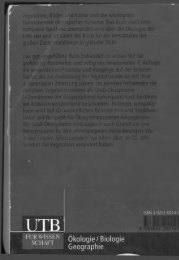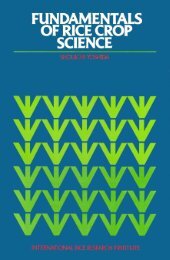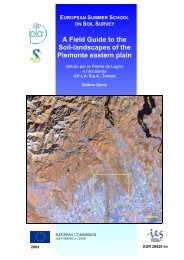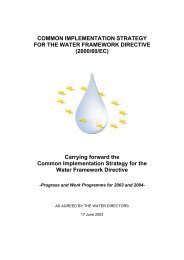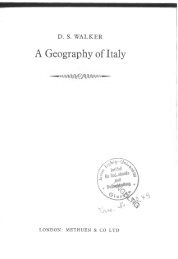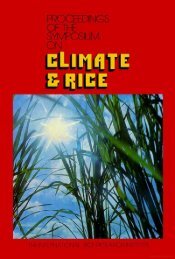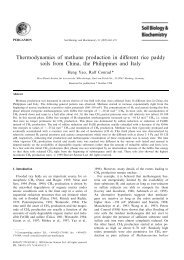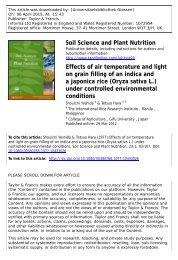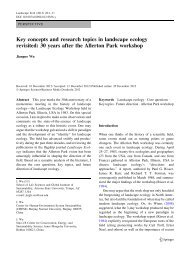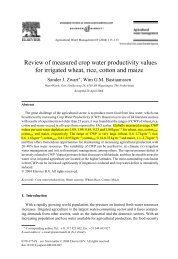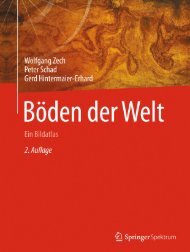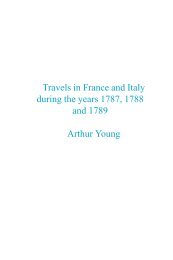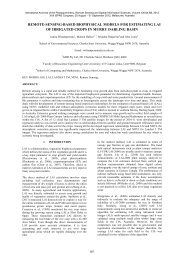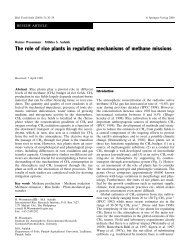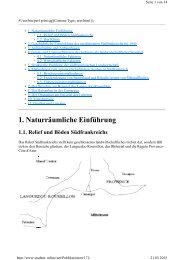Maclean et al. - 2002 - Rice almanac source book for the most important e
Maclean et al. - 2002 - Rice almanac source book for the most important e
Maclean et al. - 2002 - Rice almanac source book for the most important e
You also want an ePaper? Increase the reach of your titles
YUMPU automatically turns print PDFs into web optimized ePapers that Google loves.
to be combined in a coherent and complementary<br />
region<strong>al</strong> research program.<br />
It is with this objective that WARDA has<br />
developed <strong>the</strong> character of an “open center.” This<br />
means that WARDA provides a permanent<br />
institution<strong>al</strong> framework within which to attract,<br />
focus, and facilitate <strong>the</strong> ef<strong>for</strong>ts of a range of<br />
collaborators. The unifying factor is that <strong>al</strong>l<br />
partners contribute to solving priority region<strong>al</strong><br />
problems. While WARDA gener<strong>al</strong>ly serves as a<br />
cat<strong>al</strong>yst to identify <strong>the</strong> priority <strong>the</strong>mes and<br />
partners <strong>for</strong> collaborative research, research<br />
leadership in any given area is d<strong>et</strong>ermined on <strong>the</strong><br />
basis of institution<strong>al</strong> comparative advantage.<br />
Partnership with nation<strong>al</strong> agricultur<strong>al</strong><br />
research and extension systems (NARES)<br />
The go<strong>al</strong> of WARDA’s partnership with nation<strong>al</strong><br />
systems is to achieve <strong>the</strong> <strong>most</strong> cost-effective<br />
means of developing and transferring new rice<br />
technologies within <strong>the</strong> region as a whole.<br />
WARDA views <strong>the</strong> region<strong>al</strong> rice science<br />
infrastructure as an integrated and interdependent<br />
system. Because agroecologic<strong>al</strong> environments<br />
cut across politic<strong>al</strong> boundaries, technologies<br />
developed in any single location are usu<strong>al</strong>ly<br />
transferable to far broader areas. The objectives<br />
of WARDA’s partnership with NARES are to<br />
achieve a more complementary and efficient<br />
sharing of research tasks by <strong>al</strong>locating responsibilities<br />
on <strong>the</strong> basis of comparative advantage,<br />
and to maximize research spillover b<strong>et</strong>ween<br />
<strong>the</strong>se systems and WARDA, and among <strong>the</strong> nation<strong>al</strong><br />
systems <strong>the</strong>mselves.<br />
The Reseau Ouest <strong>et</strong> Centre Africain du Riz<br />
(ROCARIZ), a <strong>Rice</strong> Research and Development<br />
N<strong>et</strong>work <strong>for</strong> West and Centr<strong>al</strong> Africa, was created<br />
in 2000 after in-depth consultations among<br />
WARDA, <strong>the</strong> West and Centr<strong>al</strong> African Council<br />
<strong>for</strong> Agricultur<strong>al</strong> Research and Development<br />
(WECARD/CORAF), nation<strong>al</strong> research systems,<br />
and <strong>the</strong> U.S. Agency <strong>for</strong> Internation<strong>al</strong> Development<br />
(USAID). ROCARIZ is a successor n<strong>et</strong>work<br />
to <strong>the</strong> highly successful WARDA/NARS<br />
<strong>Rice</strong> Task Force Collaborative Mechanism <strong>for</strong><br />
rice research and development within <strong>the</strong><br />
subregion, which was supported financi<strong>al</strong>ly by<br />
USAID in 1991-97. ROCARIZ maintains <strong>the</strong><br />
task <strong>for</strong>ce structure with seven function<strong>al</strong> task<br />
<strong>for</strong>ces on mangrove swamps, rice breeding,<br />
Sahel re<strong>source</strong> management, integrated pest<br />
management, natur<strong>al</strong> re<strong>source</strong> management, rice<br />
economics, and technology transfer. ROCARIZ<br />
finances sm<strong>al</strong>l two-year research projects<br />
through nation<strong>al</strong> scientists in member countries.<br />
The technology transfer task <strong>for</strong>ce includes <strong>the</strong><br />
active participation of researchers, extension officers,<br />
and end-users of research results.<br />
ROCARIZ has established a <strong>for</strong>um—<strong>the</strong> Bienni<strong>al</strong><br />
Region<strong>al</strong> <strong>Rice</strong> Research Review (4Rs)—<strong>for</strong><br />
reporting and publishing rice research and development<br />
activities within <strong>the</strong> subregion. The princip<strong>al</strong><br />
stakeholders of ROCARIZ are WARDA,<br />
CORAF member countries, nation<strong>al</strong> research<br />
systems, USAID, <strong>the</strong> private sector, and rice<br />
farmers. ROCARIZ v<strong>al</strong>ues its guiding principles<br />
of trust, mutu<strong>al</strong> respect, and joint ownership—<br />
essenti<strong>al</strong> ingredients <strong>for</strong> a successful partnership<br />
program. ROCARIZ is coordinated at WARDA<br />
headquarters and is managed by a coordinator<br />
under <strong>the</strong> guidance of a steering committee composed<br />
of nation<strong>al</strong> scientists, <strong>the</strong> private sector,<br />
development agents, and a WARDA representative.<br />
WARDA’s gen<strong>et</strong>ic re<strong>source</strong>s unit comprises<br />
tradition<strong>al</strong> genebank operations, but <strong>al</strong>so <strong>the</strong><br />
Internation<strong>al</strong> N<strong>et</strong>work <strong>for</strong> Gen<strong>et</strong>ic Ev<strong>al</strong>uation of<br />
<strong>Rice</strong> in Africa (INGER-Africa). The genebank<br />
activities have taken up a higher profile with <strong>the</strong><br />
successful use of <strong>the</strong> Oryza glaberrima rice species<br />
in <strong>the</strong> development of NERICAs. Oryza<br />
glaberrima and wild African species are priority<br />
areas <strong>for</strong> collection, conservation, and<br />
characterization. During <strong>the</strong> 1990s, INGER-Africa<br />
became a demand-responsive n<strong>et</strong>work providing<br />
new gen<strong>et</strong>ic materi<strong>al</strong> <strong>for</strong> NARES partners,<br />
including nominations from <strong>the</strong> NARES<br />
<strong>the</strong>mselves (effectively <strong>al</strong>lowing such materi<strong>al</strong> to<br />
undergo region<strong>al</strong> adaptation testing). INGER-<br />
Africa has <strong>al</strong>so embarked upon studies of<br />
biodiversity (vari<strong>et</strong>y portfolio) management by<br />
farming communities.<br />
In addition to tradition<strong>al</strong> nation<strong>al</strong> partners,<br />
WARDA has recently been expanding its partnership<br />
mode to encompass <strong>the</strong> NGO community,<br />
<strong>the</strong> private sector, region<strong>al</strong> universities, and<br />
farmers’ organizations. In particular, a community-based<br />
seed system has been promoted in<br />
Côte d’Ivoire and Guinea in collaboration with<br />
NARES, NGOs, private seed companies, and<br />
farmers’ organizations.<br />
Partnership with advanced research<br />
institutions<br />
Many institutions in <strong>the</strong> glob<strong>al</strong> research<br />
community have strengths in speci<strong>al</strong>ized areas<br />
that are highly complementary to WARDA and<br />
54 <strong>Rice</strong> <strong>al</strong>manac



